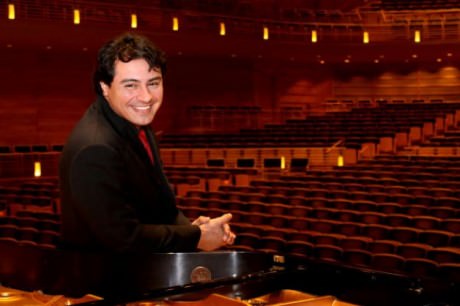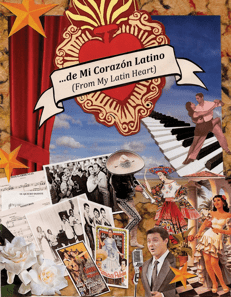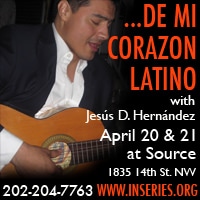Not only does Jesús Daniel Hernández posses a beautiful tenor voice, he also has a remarkable story to tell about his life, his training, being discovered, and his career. Jesús tells us about De Mi Corazón Latino [From My Latin Heart], which ends its run this Saturday night at The In Series at Source.

Joel: How did you land up performing at The In Series?
Jesús: In 2011, I met Carla at an audition and there we started the talk about doing a concert like this.
How did you select the works you perform in your program and why did you choose them?
I grew up listening to these songs because my grandfather and my father listened to them, and played them all the time. I fell in love with the romanticism of this type of music, since I was a kid. Later on I learned some of this songs, and played them on the guitar for my grandfather, and especially for my grandmother, who would listen to me all the time. Sometimes she would tell me a story about the song I would be singing, for example, “El Reloj” (The Clock). When I learned this song I was about 14 years old, and my grandma told me that a sister that she had who also sang opera, used to sing this song all the time. After finding out that her husband betrayed her with another woman, she killed herself…
This song has a lot of meaning to me, because it reminds me of my grandma sitting next to me, and hearing her stories. Another example are the songs “Virgen de Medianoche” (Midnight Virgin), “Preciosa” (Gorgeous), and “Lamento Borincano” (Puerto Rican Lament). My grandfather loved Daniel Santos, the singer who made this songs very famous in Mexico. Even though my grandfather was not Puerto Rican he truly loved the poetry of this songs, and used to sing them all the time. So when I chose the songs for this program, I tried to choose songs that were close to me.
How has your In Series experience been? How have the audiences responded? Any surprise reactions you have been receiving from the audience for a particular song or work?
My experience with The In Series has been more than great. Carla is really good at what she does, and when she added Monalisa to recite the love poems, and to play the percussion and guitar, I was more than happy, because this gives a very intimate touch to the concert, and brings together the passion of all of us. Mari Paz the pianist has been a music mother to me, since she has a lot of experience with the bolero repertoire, and also so many stories that she shares with me. Her knowledge about certain songs has given me a reference when I sing them. For example she told me the story of the song “Nosotros.” The composer had tuberculosis, and did not want to pass it on to his lover, so he wrote the song to say goodbye. Also I am very impressed with the In Series translation from Spanish to English, and how this concert got shape within just a few days. The audiences have been very responsive in general, but I have noticed that people especially like “Por una cabeza” “El reloj,” and particularly “Preciosa.”
I know that you were stationed in Iraq, What did you learn over in Iraq that has helped you with your professional career after you returned to the States?
I learned that life is too short, and to live such a short life of 70 to 80 years doing a job that does not give you any pleasure is a waste of life. I also learned to lose the fear of doing and asking for things. If I need help I ask for it, if I want to do something I ask. I won’t miss out on anything for not asking: I might get a ‘no’, but when I get a ‘yes,’ it’s a great feeling.
Where did you receive your vocal training and how would you describe your voice?
I received some vocal training for a short time when I was 27, but was mostly self-taught by listening to recordings. My serious training started in 2008 when I came to the Kennedy Center program with Placido Domingo. There I took voice lessons and music lessons and I am still constantly learning how to be a better musician, and developing a good vocal technique. I remember when I wanted to know what type of voice I had, what kind of tenor I was, a lot of people tell me different things, some that I am a dramatic tenor, or lirico spinto, others that I am just lyric. As a good teacher of mine said once, “Just sing as if you are singing a mariachi romantic song,” and now I don’t worry about what kind of tenor or singer I am. I just enjoy what I sing, of course within my repertoire limits. I have a tendency to get emotional and sometimes it reflects on my voice. It is a good thing to give color and passion to my voice, but it could affect the quality of my voice if I am not careful.
When was the first time you met Placido Domingo and what has been the best advice he has given you about singing and maintaining your voice?
I met Maestro Domingo in June of 2007 at a concert he gave in San Antonio where I sang for him in this dressing room. Maestro Domingo was very generous in bringing me to his program regardless of my lack of vocal training. He was always very concerned that I take care of my voice, and he always advised me not to go to too many parties, keep steady voice lessons, and to sing naturally. That was and has been his main thing, one of the reasons he is one of the greatest opera singers ever.
Where do you and the show go next?
I’m here in DC to finish De Mi Corazón Latino and to do a concert with Opera Camerata. After that, I have auditions in Toronto and NYC, and I go back to Texas for a concert.
What do you want audiences to take with them after seeing your show?
Simply to enjoy it and that at the end they might remember those golden days that their parents lived, or perhaps they did. I want them to take a small journey into their past personal stories and to live those moments again in their memories – at least for a couple of minutes while their favorite song or poetry is being performed..
De Mi Corazón Latino [From My Latin Heart] concludes its performances on Friday, April 20th and Saturday April 21st at 8 PM, at The In Series at Source -835 14th St., NW, in Washington, DC. For tickets, purchase them here for Friday night and here for Saturday night, or call the box office (202) 204-7763. Directions to Source.
LINKS
Watch an interview with Jesús Daniel Hernández and Placido Domingo, and listen to Jesús perform. (In Spanish and English).






